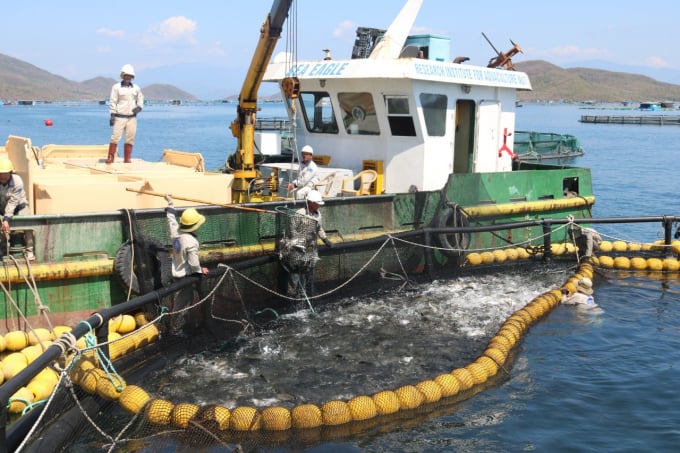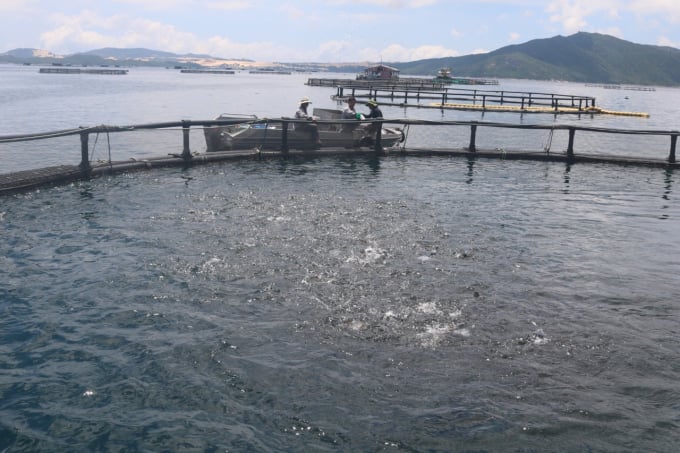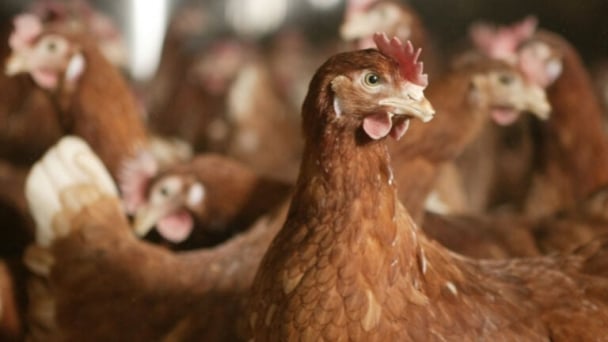June 24, 2025 | 04:00 GMT +7
June 24, 2025 | 04:00 GMT +7
Hotline: 0913.378.918
June 24, 2025 | 04:00 GMT +7
Hotline: 0913.378.918

Industrial-scale sea farming on Van Phong Bay, Khanh Hoa. Photo: KS.
Khanh Hoa has a 385 km coastline with many estuaries, lagoons, bays and approximately 200 large and small coastal islands which are very convenient for seaculture development. According to Khanh Hoa Department of Agriculture and Rural Development, the cage farming areas in this province are mainly near the shore and along the island in the lagoons and bays. Fishermen farms by following traditional procedures on a small scale. Most of the cages are made of wood which cannot withstand big waves. Cage farming technology is outdated and has not yet adapted to climate change.
Faced with the above situation, Khanh Hoa province orients to gradually reduce the area for farming ponds and cages along the shore in order to develop seaculture into a large-scale, industrial, synchronous, safe, efficient, sustainable and environmentally friendly commodity production industry. The next step is to create branded products to meet the needs of domestic and export markets.
The province gives priority to households directly engaged in seaculture whose livelihood mainly depends on income from fishing or switching from coastal fishing to aquaculture. Localities will convert traditional wooden rafts to HDPE cages that can withstand the waves, ensure safety and scenery beauty while combining with blue tourism models.

Khanh Hoa province calls for businesses with potential for blue farming. Photo: KS.
Director of Khanh Hoa Department of Agriculture and Rural Development Le Tan Ban said that the province would develop seaculture in open sea areas. The province calls for experienced and potential businesses to invest in industrial sea farming with modern cages to further increase output. Khanh Hoa also aims to promote research and application of science and technology in commercial sea farming.
Open sea areas used for seaculture will give priority to sea fishing individuals with high economic value. Khanh Hoa will form aquaculture association groups, aiming toward the establishment of seaculture cooperatives having linkages with businesses to secure product output.
To achieve the mentioned goals, the Department of Agriculture and Rural Development of Khanh Hoa will implement the seaculture development planning when the “2021 - 2030 Khanh Hoa Plan - vision to 2050’ is approved. The provincial agriculture sector will at the same time invest in the infrastructure of the farming area, releasing guidance buoys, and dividing plots and creeks to both create scenery beauty and ensure the environmental capacity of the farming areas.
Khanh Hoa will reorganize the number of inshore cages and allocate the sea areas so that people can rest assured to conduct sea farming; raise awareness and instruct farmers to convert traditional raft cages to HDPE cages that are able to withstand the waves and ensure safety; combine farming with sea tourism models.
Khanh Hoa Department of Agriculture and Rural Development will also develop a hi-tech sea aquaculture scheme in the province until 2030. The scheme will mainly prioritize research, development of criteria, selection of subjects and farming technology suitable for coastal waters, in which some pilot mariculture models are being implemented to serve as the foundation for conversion.
Regarding the open sea areas for seaculture, a survey and general assessment of the environmental and hydrodynamic characteristics will be carried out. And from that the provincial agriculture sector will determine the zoning of the open seaculture sites, then select appropriate offshore seaculture technology and build a product value chain to improve added value and meet the requirements of the consumption market.
The Department of Agriculture and Rural Development will conduct further studies and proposes policies to support fishermen to change careers for aquaculture households that have been cleared or relocated, policies to encourage fishermen and enterprises to invest in hi-tech farming in sea areas managed by the province, and policies to support vocational training to create a source of high-quality human resources for management, research and production.
Khanh Hoa province will create favorable conditions to attract businesses inside and outside the province to invest in manufacturing equipment and means for industrial sea farming as well as large-scale production of seeds, industrial feed, and logistics services for industrial seaculture in a sustainable direction.
According to Khanh Hoa Department of Agriculture and Rural Development, the whole province has five main tidal farming areas including Van Ninh, Cam Lam, Ninh Hoa, Nha Trang and Cam Ranh. The total farming area is over 4,000 ha, producing an output of over 18,000 tons per year. The province’s seaculture is concentrated in four areas including Van Ninh, Ninh Hoa, Nha Trang and Cam Ranh with the main farming objects being lobster and marine fish species.
Translated by Samuel Pham

(VAN) Research has shown that Hy-Line brown hens may be better suited for cage-free production based on overall greater egg production and other quality metrics.
![Turning wind and rain into action: [9] Digitizing hydrometeorological data in response to climate change](https://t.ex-cdn.com/nongnghiepmoitruong.vn/608w/files/news/2025/06/17/z6704423696987_15fd32ffc26d590d204d520c9dac6786-nongnghiep-165943.jpg)
(VAN) Farmers have begun accessing hydrometeorological applications to adjust their cropping schedules, aiming to ensure productivity and adapt to climate change.
![Turning wind and rain into action: [8] Real-time salinity detection and early warning technology](https://t.ex-cdn.com/nongnghiepmoitruong.vn/608w/files/news/2025/06/17/z6704423696987_15fd32ffc26d590d204d520c9dac6786-nongnghiep-151127.jpg)
(VAN) Thanks to the integration of modern hydrological-hydraulic models, remote sensing technologies, and artificial intelligence, the accuracy of hydrological forecasting has significantly improved.
![Turning wind and rain into action: [7] Early disaster warnings help marine farmers minimize losses](https://t.ex-cdn.com/nongnghiepmoitruong.vn/608w/files/news/2025/06/17/z6704423696987_15fd32ffc26d590d204d520c9dac6786-nongnghiep-142942.jpg)
(VAN) In recent years, thanks to early disaster warnings and forecasting, marine farmers in Khanh Hoa province have been able to reduce risks and losses, thereby improving production efficiency.
![Turning wind and rain into action: [6] ‘Four on-the-spot’ disaster management software](https://t.ex-cdn.com/nongnghiepmoitruong.vn/608w/files/news/2025/06/17/e5a48259d6a262fc3bb3-nongnghiep-183800.jpg)
(VAN) By simply activating the scenario on the disaster management software, the relevant authorities immediately know how many households need to be evacuated, where to evacuate them to, and by what means of transportation…
![Turning wind and rain into action: [5] Hue applies modern technology in disaster forecasting](https://t.ex-cdn.com/nongnghiepmoitruong.vn/608w/files/news/2025/06/17/z6704423696987_15fd32ffc26d590d204d520c9dac6786-nongnghiep-093938.jpg)
(VAN) In Hue city, modern technology has recently been applied in meteorological and hydrological forecasting and warning, helping to reduce the damage caused by natural disasters.

(VAN) A cutting-edge farming technique being implemented on an experimental ranch in Arizona's Sonoran Desert has already saved a billion gallons of water over five years, according to Civil Eats.